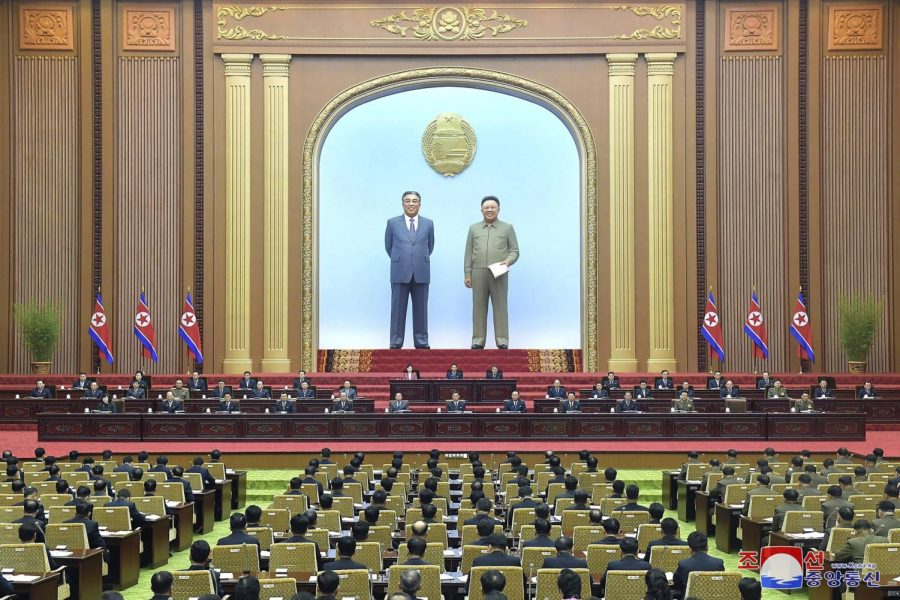Kim Jong Un calls for mass production of missiles
Korean Central News Agency | Korea News Service via AP
This image of the North Korean Parliament was provided by the North Korean government. Independent journalists were not given access to cover the event depicted.
Since the end of the Korean War in 1953, North Korea has been seeking to unify the peninsula under their authoritarian regime.
At the end of December, the North Korean Workers’ Party met for a five day meeting not long after a North Korean surveillance drone was spotted in South Korean Airspace. At the conference, Kim Jong Un called for the mass production of short range nuclear missiles to be used against South Korea and the production of a long range ballistic missile to be used against the United States, according to the New York Times.
Hyejin Kim, DePaul public relations and advertising professor, grew up in South Korea and is used to the North Korean threat.
“The threat we receive from North Korea has been pretty aggressive recently, so it gives me some concerns but it’s actually not really new to Koreans,” Kim said. “We’ve been dealing with this for 50 plus years.”
Despite the ever-present threat that Kim grew up with, she had noticed a shift in North Korean attitudes.
“Recently, North Korea’s attitude toward South Korea has been aggressive, because ever since we had a conservative president elected, the tensions between North Korea and South Korea have been getting increased,” Kim said.
The cause behind the rise in tensions could be attributed to South Korea’s attitude towards North Korea more than it could be attributed to North Korea itself.
“North Korean behavior I would say is quite consistent, so if you look at the party documents and the ideology and the orientation and the world view of the senior leadership, of course they’re dissatisfied with the division of Korea and they would like to see Korea unified under their terms … they’ve never renounced the use of force to reach their goal,” said Daniel Pinkston, international relations lecturer at Troy University in Alabama.
Pinkston is currently teaching in South Korea under a U.S. military contract.
North Korea has been sending drones into South Korean airspace for years, but December marked one of the rare times that South Korea dispatched fighter jets to take down the drones, according to the New York Times.
“From the standpoint of the South Korean government, it is expected that North Korea will step up its conventional provocations,” said Dong Hyun Lee, DePaul Korean Association president. “If North Korea makes another provocation like this, there will be a bigger response.”
Many South Koreans hold unsavory feelings towards the North Korean government and military due to the threat it poses against South Koreans.
“Korean men have to finish mandatory military service because of North Korea,” Lee said. “That is why most people are hostile to North Korea. Unless North Korea directly attacks South Korean territory, South Koreans don’t feel it’s a big threat because it’s a frequent occurrence.”
In 2022, South Korea welcomed Yoon Suk Yeol as its new president. Yoon’s conservative stance leaves little tolerance for North Korea’s provocations.
“Every president has their own stance towards North Korea, and especially this president has a more aggressive attitude towards North Korea,” Kim said.
Yoon has named North Korea as South Korea’s enemy, and his attitude prompted Kim Jong Un to call for missile production at the Workers’ Party conference.
“President Yoon Suk Yeol has taken a hardline stance on North Korea since the beginning of his inauguration, so it is unlikely that his position will change dramatically,” Lee said.
Postdoctoral fellow at Stanford’s Walter H. Shorenstein Asia-Pacific Research Center Kyuri Park is optimistic about North and South Korean relations.
“I don’t think it will go to a full fledged war, rather the two sides will opt for negotiation,” Park said.
If North Korea does decide to declare war against South Korea, it would happen gradually.
“It would be an observable process, kind of, going to war, and then there would be reluctance to use nuclear weapons because then that’s game over because the U.S. has a security treaty obligation to respond and retaliate,” Pinkston said.
Most likely, North Korea will not start a nuclear war since there is an extremely slim chance that it would result in North Korea’s success.
“If a war breaks out between the two Koreas, the Chinese military will intervene, but the Chinese military is not as strong as the U.S.,” Lee said. “Therefore, the probability that the North Korean army will win is close to zero.”
North Korea is known for its oppressive regime and human rights violations. Not much is known about life in North Korea, but it is known that almost all aspects of citizens’ lives are controlled by the government and they are unable to access most non-North Korean media.
“These people [North Koreans] have been living here since they were born, they have no concept of freedom,” Park said.
Park believes there is a better way to free North Korean citizens from their government than by going to war.
“Give them [non-North Korean] media so they know what freedom is so they can help themselves,” Park said.







